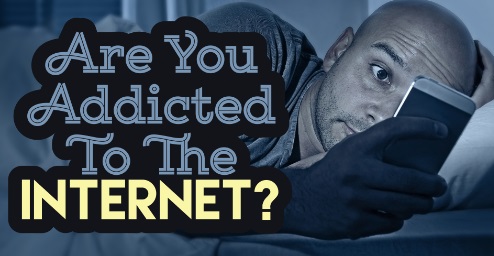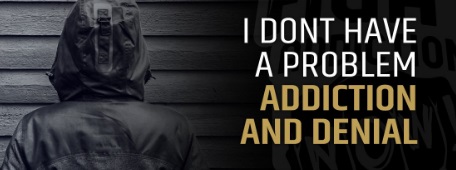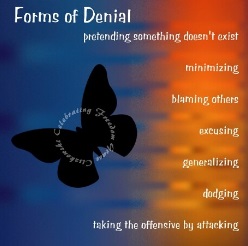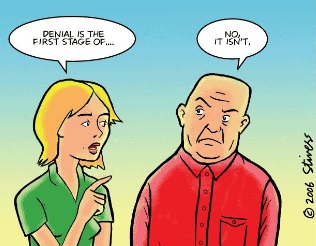https://files.peakd.com/file/peakd-hive/lucylin/3mDyGd7a-4.jpg
Before I go into the details concerning addictions and denial, and how to recognize them (both in yourself and in others) , I have to say that this is one area of modern psychology I generally disagree with. Addictions are _always_ viewed as 'a problem' in scientific articles, papers, and studies. I see it differently - from my own experiences.

For example, I know of no _really_ successful businessman that _isn't_ addicted to their work ,or money - or power. I know of no exceptional athletes that are not addicted to their activity, either... Addiction has a bad reputation when framed in modern academic circles, and one that, in my opinion, is over simplistic and, fundamentally, misunderstood. Personally, I think that we are _all_ addicts in one way or another, and would even go one step further and say... ##### FINDING YOUR _POSITIVE ADDICTION_ IN LIFE CAN MAKE YOU MUCH HAPPIER. That being said, there's a LOT of negative addictions - but again, I'm not convinced the _addiction itself_ is the problem. _Lack of purpose_ for example, plays a far greater role in the negative aspect of addiction than the chemical, or pastime, that you're addicted _to_. This is my own perspective on addiction and does not negate the damaging effects _negative_ addictions can have on anyone. (Both personally, and to those around them). I've seen firsthand the destruction that it can cause. Lets begin...

First off, there's _nothing wrong_ about having fun and feeling good. Ergo, pleasurable activities are not inherently wrong (not to be confused with suppressing guilt and shame issues via distractions of some kind.) The fine line between healthy pastime activities - and addiction - is where it can take a negative turn. This can be anything - Netflix, social media, going to the gym, food, sex, or video games - any of these activities have that line, the one that crosses over from positive, into _negative_ , territory. With negative addictive behaviors there's various indicators that you can use in which to determine the degree of severity... Prioritizing: How relevant is it to maintaining your sense of self identity - i.e _who_ you are? The importance attached to the activity is measured by _how much_ you’re devoting to it (and in conjunction with letting other things in your life, slide becuase of it). Priority equals importance. Your actions _are telling you_ - ***if*** you choose to listen The Reward: Do you feel better when you're engaged in whatever addiction it is, that you have?More in control of your life? Conversely, by _not doing it_, does it make you feel worse? Anxious? Agitated? Creeping Insidiousness: If you find yourself doing it more and more often - and for longer periods of time than originally planned, this could be an indicator of compulsion. If you find yourself saying “Just a little bit longer...” it means that you’re allotting more and more space in your life to this activity (more and more time on social media) ? To carve out this extra time of a finite resource - what other part of your life are sacrificing _for_ it? Hours working? Fitness? Good quality sleep? Poor dietary habits? There's always price to pay for your choices, and if the compulsive side of your addiction is creeping up on you, unawares - then the price you pay for carving out that extra time may be a much higher one than you ever considered. 'Cold turkey': Going cold turkey (a cessation of the activity) is a very good way to gauge the level of your addiction. Do you start to feel anxious or uncomfortable if you cannot do it? Your emotional and physical responses to this new paradigm can tell you lots. The higher the level of panic, anxiety, and mental turmoil that you experience in withdrawal, the stronger the addition _is_. External clues: Has the activity disrupted your regular life activities and/or your relationships? Due to the finite amount of time that any of us have, the more time focused on the activity, _the less_ time there is to spend anywhere else. You can only spend your time once, so while the knock on effects of using up more of your time associated with the activity may be very subtle, they're still important. If you're aware of the issue and do not do anything to rectify it, then you know that your addiction is 'in the driving seat' of your mind - and not yourself. Repetition: Do you say to yourself that you’re going to do something different not invovling your activity - and then turn around and find a reason (justification) to keep doing _exactly that same thing that you said you were not doing? All of these signs indicate having an addiction. #### Addiction is a behavior that controls _you_. #### You are NOT in the driving seat of your mind, no matter how much that you tell yourself that you are. ##### Addiction 'recovery' can’t even start until an addict realizes that they have a problem. If an addict can’t (or won’t) recognize that they have a problem, then they are considered to be _in denial_.

Being in denial of the problem has certain 'tell-tale signs'. The person will always try to avoid talking about it. They will deflect any questions about it, and they definitely won’t admit to having a problem. Addicts often avoid people (and social situations) if they feel that they’ll have to openly discuss their addictive activities. Addicts will try to compare their behavior to others. This helps them to justify their behavior - both to themselves and to others. They will _rationalize_ it and find a way to make their activity - and the time spent on it - 'acceptable' in some way or other. _Basing your behaviors on someone else (comparing and rationalizing) is an indicator of being in denial_. _Comparison_ is an addict’s way of deflecting the attention away from their own addiction , to distract _away_ from the problem and avoid facing the reality of the situation. If you try to minimize the severity of addiction, then you're trying to _deny_ to yourself that there's a problem in the first place. And equally - If you try to _convince_ your friends or family that your addiction is 'under control' , it also indicates being in denial. _It means that you're unable to admit (even to yourself) that you have a problem_. (There is _no need_ to try and convince anyone that you don’t have a problem - if there isn't one... is there?) Telling yourself or others that you have 'everything under control' is a very dangerous stage of denial. If you find yourself not caring about the negative consequences of your addiction, (work, fitness, health, sleep, etc.) the addict in denial _will not connect the dots_ ( i.e. a refusal to accept reality) between the consequences and their addictive behavior. ##### Addicts in deep denial are okay with their behaviors. If you feel that you don’t have a problem — but everyone else around you _does_, it' a sign that you could be very much in a state of denial. _Denial_ is a very dangerous position for the addict to be in.

Recognizing that you _have_ an addiction means having a clear perspective about your behavior. It means taking responsibility for yourself, and not trying to deflect, project, or pretend anymore... ***On a personal note:*** I've had many 'addictions' over the years - I've lost count. (actually , I don't bother counting them.) Booze, sex, coke, _power_, you name it, I've tried it. But guess what? I _knew_ of my addictive personality. I knew myself to some degree, even back then (and the possible reasons _behind_ my personality). This knowledge in and of itself (along with the stubbornness of a donkey in a particularly stubborn mood) meant that the addictions were always out in the open, talked about, and recognized. _I had no shame or guilt attached to my behavior_(and that changes _everything_, going from my observations in other people over the years). I was also able kicked any - and all - of my habits , whenever I chose to. Always. Interestingly, the _power addiction_ , was one of the most difficult to leave behind. The 'chemical addictions' are the easiest of all to address (for me). It simply a matter of a couple of days of total boredom and a very bad mood - and hey presto!.... it's like you've never even had the habit. _I'm fully aware of my 'strength of character' (a stubborn idiot) and I know that being self aware - and ***never in denial*** to the reality of any situation, I think it allowed me to 'move on' whenever I chose to._ I have no regrets over my party - and addiction - years, and _very_ glad that I experienced all that I did (it's a young persons game) but as in anything in life, you grow up. move on, and thus the desire to pursue that kind of lifestyle just faded away. I feel very lucky to have experience all that I have in those party years - and then to come out of it 'the other side' relativity unscathed - and seemingly very healthy to boot! Control your addictions, don't let them control you...And that means _***never being in denial***_ ...and be happy!

And have a great Sunday, everybody!

Originally posted here: https://hive.blog/hive-122315/@lucylin/the-psychology-of-denial-part-2-addictions-and-the-warning-signs





No comments:
Post a Comment